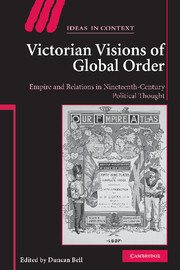 Victorian Visions of Global Order
Victorian Visions of Global Order Book contents
- Frontmatter
- Contents
- Contributors
- Chapter 1 Victorian visions of global order: an introduction
- Chapter 2 Free trade and global order: the rise and fall of a Victorian vision
- Chapter 3 The foundations of Victorian international law
- Chapter 4 Boundaries of Victorian international law
- Chapter 5 ‘A legislating empire’: Victorian political theorists, codes of law, and empire
- Chapter 6 The crisis of liberal imperialism
- Chapter 7 ‘Great’ versus ‘small’ nations: size and national greatness in Victorian political thought
- Chapter 8 The Victorian idea of a global state
- Chapter 9 Radicalism and the extra-European world: the case of Karl Marx
- Chapter 10 Radicalism, Gladstone, and the liberal critique of Disraelian ‘imperialism’
- Chapter 11 The ‘left’ and the critique of empire c. 1865–1900: three roots of humanitarian foreign policy
- Chapter 12 Consequentialist cosmopolitanism
- Index
- Ideas in Context
Chapter 8 - The Victorian idea of a global state
Published online by Cambridge University Press: 22 September 2009
- Frontmatter
- Contents
- Contributors
- Chapter 1 Victorian visions of global order: an introduction
- Chapter 2 Free trade and global order: the rise and fall of a Victorian vision
- Chapter 3 The foundations of Victorian international law
- Chapter 4 Boundaries of Victorian international law
- Chapter 5 ‘A legislating empire’: Victorian political theorists, codes of law, and empire
- Chapter 6 The crisis of liberal imperialism
- Chapter 7 ‘Great’ versus ‘small’ nations: size and national greatness in Victorian political thought
- Chapter 8 The Victorian idea of a global state
- Chapter 9 Radicalism and the extra-European world: the case of Karl Marx
- Chapter 10 Radicalism, Gladstone, and the liberal critique of Disraelian ‘imperialism’
- Chapter 11 The ‘left’ and the critique of empire c. 1865–1900: three roots of humanitarian foreign policy
- Chapter 12 Consequentialist cosmopolitanism
- Index
- Ideas in Context
Summary
When we have accustomed ourselves to contemplate the whole Empire together and call it England, we shall see that here too is a United States. Here too is a homogeneous people, one in blood, language, religion, and laws, but dispersed over a boundless space.
INTRODUCTION
Modern politics, Jens Bartelson reminds us, is ‘intelligible only in terms of the state’. Western political experience is so conditioned by the structures of sovereign authority, by the apparatus of coercion available to the state, and by the rigid distinctions between the domestic and the foreign, that ‘We simply seem to lack the intellectual resources necessary to conceive of a political order beyond or without the state, since the state has been present for long enough for the concept to confine our political imagination.’ Despite this, or perhaps because of it, the scope, content, functions, and future of the state remain as hard to identify as ever. Conceptually and empirically, it is both present and absent, foregrounded in political consciousness but receding into the distance at each attempt to grasp its specificity. Although many attempts have been made by radical political theorists and – in an ironic mirror of the post-political universe of Marxism – by the neo-liberal prophets of globalisation to envisage a space beyond the state, it seems exceptionally difficult to escape.
The nineteenth century witnessed numerous attempts to think beyond the state, to imagine new forms of human association. Marx's grand vision was but the most ambitious.
- Type
- Chapter
- Information
- Victorian Visions of Global OrderEmpire and International Relations in Nineteenth-Century Political Thought, pp. 159 - 185Publisher: Cambridge University PressPrint publication year: 2007
- 7
- Cited by
